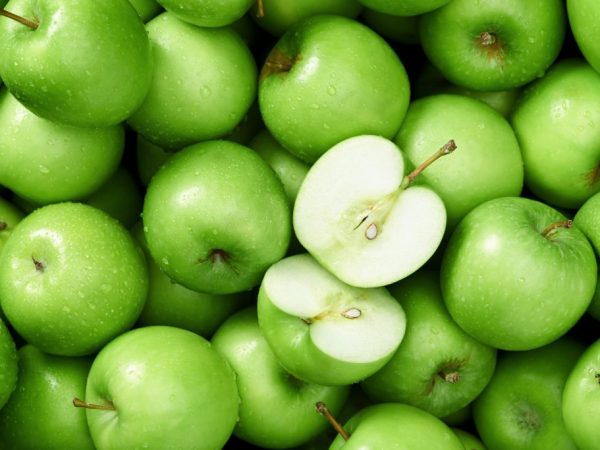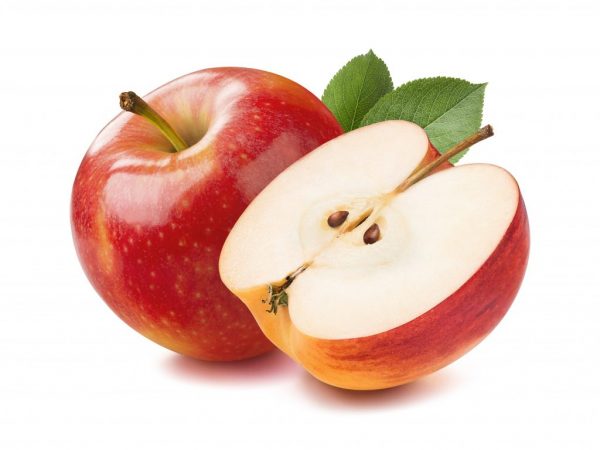Iron in apples
Iron is an essential element for human life. First of all, it is responsible for transporting oxygen to all cells of the body. If this function is not fulfilled, physical and mental activity decreases, the heart rhythm is disturbed. The iron in apples is one of the available sources of replenishment in our body.

Iron in apples
Consumption rate
On average, the human body contains 4-5 grams of this element, of which most is involved in the transfer of oxygen, and the rest is located in muscle tissue, bone marrow and internal organs.
This stock needs to be replenished daily.
- For women, the daily intake (15-17 mg) is higher for physiological reasons than for men (10 mg).
- Adolescents (14 to 18 years old) also need an increased portion of Fe (1-14 mg).
- Newborns make do with their own mineral supply.
- Children from 0.5 to one year old need 1 mg of iron per day.
- After a year and up to 3 years, the daily intake is 7 mg.
- From 4 to 8 years old, children should receive 10 mg of this element, and from 9 to 13 years old - 8 mg.
The benefits of apples
The composition of apples, of course, contains iron: per 100 grams of the product - 2.2 mg.
It would seem that all the problems have been solved. However, in reality, the mineral is not completely absorbed from plant foods. The human body receives only 3-7% of the consumed amount. This is too small to cover the daily requirement and therefore many believe that the usefulness of these fruits is a myth.
Of course, there are foods in which the iron content is much higher, but apples are also useful.
There are several factors that improve the absorption of the mineral.
First of all, we are talking about vitamin C, the content of which in sour apple varieties exceeds 5 mg per 100 g.
In addition, for the effective assimilation of Fe, vitamin A and folic acid (B9) are needed - all of which are in apples. It follows from this that there are additional favorable conditions for the assimilation of the mineral.
Of course, apples alone cannot meet the daily iron requirement, but they are undoubtedly useful for a balanced diet.
Which to choose

It is good to eat whole apples with peels
Of the red, yellow and green apples, the latter have the greatest benefits.
According to scientific research, in some green apple varieties, the iron content is significantly higher than the average (for example, in the Semerenko variety).
And green fruits also contain more vitamin C, which contributes to better absorption of iron.
However, there are ruddy varieties with a sour taste, which are also high in vitamin C (for example, the Airlie Geneva variety).
Dried fruits retain a significant part of Fe, but little vitamins remain in them.
Vitamin C is destroyed very quickly - not only during heat treatment, but also when cutting the fruit. Eating whole, fresh fruits with the skin is best.
Advice
It is not only important which apples have the most iron, but also how to improve its absorption in order to get the maximum benefit.
- To improve the absorption of Fe, combine apples with foods that contain vitamin A, such as carrots or pumpkin. So, the benefits of apple juice will increase if you mix it with pumpkin or carrot juice (which, by the way, will also improve the taste of the drink).
- Great combination of meat and green apples (for example: duck stuffed with sour apples). An additional benefit of this dish is that the meat is easier to digest with green fruits.
- It is also useful to combine apples with foods containing folic acid: oranges, mangoes, avocados, green salad and spinach. This is convenient when preparing prefabricated smoothies and fresh juices.
- The favorite combination of all pastry chefs is apples and cinnamon. They also aid in the absorption of Fe.
- Foods high in Ca or Mg interfere with the absorption of iron. Combining apples and sesame seeds / nuts / seeds / chocolate is not worth it. It's delicious, but the benefits are diminishing.
- Homemade apples, grown with their own hands or purchased from trusted gardeners, give more chances to assimilate Fe. The skin of store fruits is covered with wax and needs to be cut off, which destroys a lot of vitamin C. In addition, store apples are rarely just picked, and the longer the fruit has been lying, the less vitamins it contains.
Conclusion
The iron content in apples does not allow meeting a person's daily need, but still, the benefits of these fruits are not a myth. Due to the presence of vitamins C, A and B9, the mineral is better absorbed by the body.
Thus, apples from the garden will be an excellent addition to a balanced diet that will help replenish the stocks of valuable substances we need.

